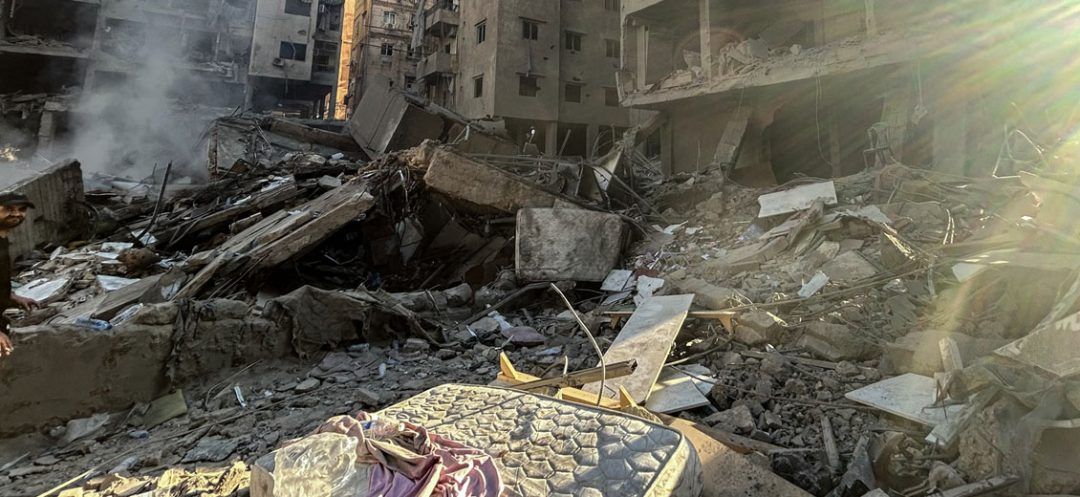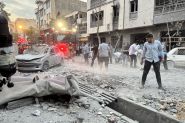- Home
- War in the Middle East
- Editorial: Southern Suburbs – A Tragic Turning Point

Speculations, some of them starkly explicit, have been circulating widely in the media and across social networks. Yet, few could have anticipated the staggering events that unfolded on the night of Friday, September 27, and into the early hours of Saturday. No one could have foreseen the brutal and devastating bombardment of Hezbollah’s central command, aimed at the entire leadership of the pro-Iranian party, followed just hours later by a relentless barrage of iron and fire raining down on the southern suburbs.
At dawn on Saturday, the full extent of the previous day's raid, particularly in terms of the heavy loss of human life (not to mention the political fallout), was still unfolding. It may take several days to fully grasp the magnitude of the shockwave that has rocked the nation in recent hours. Yet, one thing is certain: the conflict between Israel and Hezbollah has entered a new and unprecedented chapter, marking a historic turning point in more ways than one, regardless of the turn of events.
Recent discussions have centered on what some are calling Hezbollah’s “abandonment” by Tehran. Supreme Leader Ali Khamenei, newly elected President Massoud Pezechkian, and, most notably, Vice President Mohammad Javad Zarif—known for his advocacy of engagement with the West—have made statements signaling a clear intent to pursue rapprochement with the United States, aiming for a broader agreement that includes, among other priorities, the nuclear issue.
Is the new stance adopted by Tehran's leadership—particularly by the Supreme Leader—merely a tactical maneuver aimed at “lulling” its adversaries into complacency, with hopes of securing certain advantages before reasserting their position? Or, has the regime of the mullahs finally acknowledged that it cannot contend with the vast technological gap separating it from the United States and Israel? This disparity has been made evident by the advanced bombs used in the attack on Hezbollah's command center and the highly sophisticated tactics deployed by the Israeli military over the past year.
Tehran's conduct in this unfolding phase will reveal the true answer to these questions. If the mullahs' regime has indeed shed its ideological rigidity and embraced a more pragmatic outlook, we should not expect an aggressive or radical response, apart from the predictable inflammatory rhetoric in the coming hours. In that case, the election of President Pezechkian, regarded as a moderate reformist, along with Khamenei's recent call for a “tactical withdrawal” — both politically and militarily — in the face of the “enemy,” could mark the first signs of a genuine shift in Tehran’s strategy.
In the latter scenario, however, another critical question emerges: By launching the deadly and destructive raid on Hezbollah’s headquarters, has Netanyahu’s cabinet crossed all red lines, potentially forcing Khamenei to rethink his strategy in the face of an adversary that demonstrated on Friday its resolve to go to the very end, even at the risk of igniting a regional war? Does the Iranian regime truly have the capacity to meet Netanyahu’s challenge, beyond the possibility of sporadic, face-saving acts of terrorism?
The uncertainties surrounding this issue are likely to be resolved soon However, as Lebanon and the region visibly enter this new phase, it is essential to engage in a thorough and profound reflection on the political vision that Hezbollah has carried for years. This reflection must particularly address the plight of the Shiite community over the past several decades. Are the Shiite community, along with broader Lebanese society, not now bearing the consequences of sidelining visionary Shiite leaders such as Imam Moussa al-Sadr, Imam Mohammed Mehdi Chamseddine, Sheikh Mohammed Hussein Fadlallah, Sheikh Hani Fahs, and many others? These leaders recognized the looming catastrophe, consistently cautioned against the destructive Khomeinist ideology, and promoted a Lebanese path built on balanced and harmonious relationships with other societal groups.
The dire situation facing the Shiite community today warrants an urgent and serious examination of these vital existential questions in the near future.
At dawn on Saturday, the full extent of the previous day's raid, particularly in terms of the heavy loss of human life (not to mention the political fallout), was still unfolding. It may take several days to fully grasp the magnitude of the shockwave that has rocked the nation in recent hours. Yet, one thing is certain: the conflict between Israel and Hezbollah has entered a new and unprecedented chapter, marking a historic turning point in more ways than one, regardless of the turn of events.
Recent discussions have centered on what some are calling Hezbollah’s “abandonment” by Tehran. Supreme Leader Ali Khamenei, newly elected President Massoud Pezechkian, and, most notably, Vice President Mohammad Javad Zarif—known for his advocacy of engagement with the West—have made statements signaling a clear intent to pursue rapprochement with the United States, aiming for a broader agreement that includes, among other priorities, the nuclear issue.
Is the new stance adopted by Tehran's leadership—particularly by the Supreme Leader—merely a tactical maneuver aimed at “lulling” its adversaries into complacency, with hopes of securing certain advantages before reasserting their position? Or, has the regime of the mullahs finally acknowledged that it cannot contend with the vast technological gap separating it from the United States and Israel? This disparity has been made evident by the advanced bombs used in the attack on Hezbollah's command center and the highly sophisticated tactics deployed by the Israeli military over the past year.
Tehran's conduct in this unfolding phase will reveal the true answer to these questions. If the mullahs' regime has indeed shed its ideological rigidity and embraced a more pragmatic outlook, we should not expect an aggressive or radical response, apart from the predictable inflammatory rhetoric in the coming hours. In that case, the election of President Pezechkian, regarded as a moderate reformist, along with Khamenei's recent call for a “tactical withdrawal” — both politically and militarily — in the face of the “enemy,” could mark the first signs of a genuine shift in Tehran’s strategy.
In the latter scenario, however, another critical question emerges: By launching the deadly and destructive raid on Hezbollah’s headquarters, has Netanyahu’s cabinet crossed all red lines, potentially forcing Khamenei to rethink his strategy in the face of an adversary that demonstrated on Friday its resolve to go to the very end, even at the risk of igniting a regional war? Does the Iranian regime truly have the capacity to meet Netanyahu’s challenge, beyond the possibility of sporadic, face-saving acts of terrorism?
The uncertainties surrounding this issue are likely to be resolved soon However, as Lebanon and the region visibly enter this new phase, it is essential to engage in a thorough and profound reflection on the political vision that Hezbollah has carried for years. This reflection must particularly address the plight of the Shiite community over the past several decades. Are the Shiite community, along with broader Lebanese society, not now bearing the consequences of sidelining visionary Shiite leaders such as Imam Moussa al-Sadr, Imam Mohammed Mehdi Chamseddine, Sheikh Mohammed Hussein Fadlallah, Sheikh Hani Fahs, and many others? These leaders recognized the looming catastrophe, consistently cautioned against the destructive Khomeinist ideology, and promoted a Lebanese path built on balanced and harmonious relationships with other societal groups.
The dire situation facing the Shiite community today warrants an urgent and serious examination of these vital existential questions in the near future.
Read more




Comments